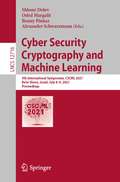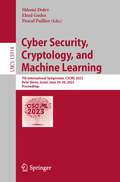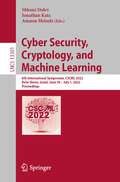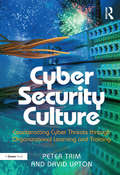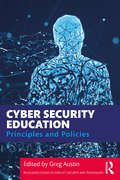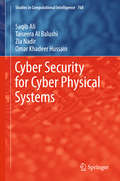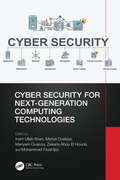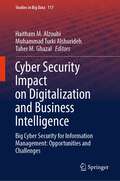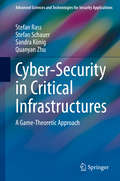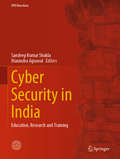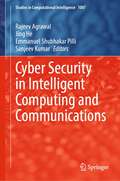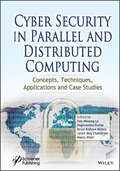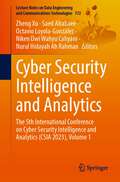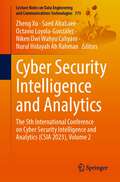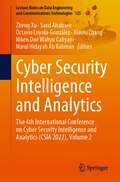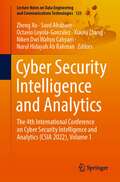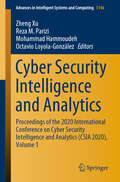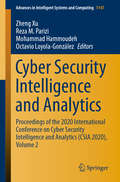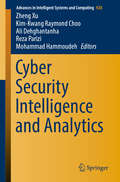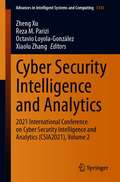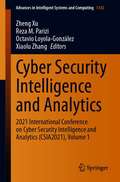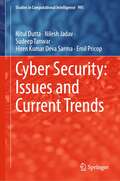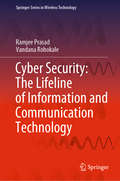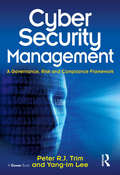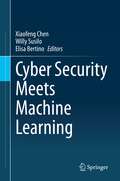- Table View
- List View
Cyber Security Cryptography and Machine Learning: 5th International Symposium, CSCML 2021, Be'er Sheva, Israel, July 8–9, 2021, Proceedings (Lecture Notes in Computer Science #12716)
by Shlomi Dolev Oded Margalit Benny Pinkas Alexander SchwarzmannThis book constitutes the refereed proceedings of the 5th International Symposium on Cyber Security Cryptography and Machine Learning, CSCML 2021, held in Be'er Sheva, Israel, in July 2021.The 22 full and 13 short papers presented together with a keynote paper in this volume were carefully reviewed and selected from 48 submissions. They deal with the theory, design, analysis, implementation, or application of cyber security, cryptography and machine learning systems and networks, and conceptually innovative topics in these research areas.
Cyber Security, Cryptology, and Machine Learning: 7th International Symposium, CSCML 2023, Be'er Sheva, Israel, June 29–30, 2023, Proceedings (Lecture Notes in Computer Science #13914)
by Shlomi Dolev Ehud Gudes Pascal PaillierThis book constitutes the refereed proceedings of the 7th International Symposium on Cyber Security, Cryptology, and Machine Learning, CSCML 2023, held in Be'er Sheva, Israel, in June 2023.The 21 full and 15 short papers were carefully reviewed and selected from 70 submissions. They deal with the theory, design, analysis, implementation, and application of cyber security, cryptography and machine learning systems and networks, and conceptually innovative topics in these research areas.
Cyber Security, Cryptology, and Machine Learning: 6th International Symposium, CSCML 2022, Be'er Sheva, Israel, June 30 – July 1, 2022, Proceedings (Lecture Notes in Computer Science #13301)
by Shlomi Dolev Jonathan Katz Amnon MeiselsThis book constitutes the refereed proceedings of the 6th International Symposium on Cyber Security Cryptography and Machine Learning, CSCML 2022, held in Be'er Sheva, Israel, in June - July 2022. The 24 full and 11 short papers presented together with a keynote paper in this volume were carefully reviewed and selected from 53 submissions. They deal with the theory, design, analysis, implementation, or application of cyber security, cryptography and machine learning systems and networks, and conceptually innovative topics in these research areas.
Cyber Security Culture: Counteracting Cyber Threats through Organizational Learning and Training
by David Upton Peter TrimFocusing on countermeasures against orchestrated cyber-attacks, Cyber Security Culture is research-based and reinforced with insights from experts who do not normally release information into the public arena. It will enable managers of organizations across different industrial sectors and government agencies to better understand how organizational learning and training can be utilized to develop a culture that ultimately protects an organization from attacks. Peter Trim and David Upton believe that the speed and complexity of cyber-attacks demand a different approach to security management, including scenario-based planning and training, to supplement security policies and technical protection systems. The authors provide in-depth understanding of how organizational learning can produce cultural change addressing the behaviour of individuals, as well as machines. They provide information to help managers form policy to prevent cyber intrusions, to put robust security systems and procedures in place and to arrange appropriate training interventions such as table top exercises. Guidance embracing current and future threats and addressing issues such as social engineering is included. Although the work is embedded in a theoretical framework, non-technical staff will find the book of practical use because it renders highly technical subjects accessible and links firmly with areas beyond ICT, such as human resource management - in relation to bridging the education/training divide and allowing organizational learning to be embraced. This book will interest Government officials, policy advisors, law enforcement officers and senior managers within companies, as well as academics and students in a range of disciplines including management and computer science.
Cyber Security Education: Principles and Policies (Routledge Studies in Conflict, Security and Technology)
by Greg AustinThis book investigates the goals and policy aspects of cyber security education in the light of escalating technical, social and geopolitical challenges. The past ten years have seen a tectonic shift in the significance of cyber security education. Once the preserve of small groups of dedicated educators and industry professionals, the subject is now on the frontlines of geopolitical confrontation and business strategy. Global shortages of talent have created pressures on corporate and national policy for workforce development. Cyber Security Education offers an updated approach to the subject as we enter the next decade of technological disruption and political threats. The contributors include scholars and education practitioners from leading research and education centres in Europe, North America and Australia. This book provides essential reference points for education policy on the new social terrain of security in cyberspace and aims to reposition global debates on what education for security in cyberspace can and should mean. This book will be of interest to students of cyber security, cyber education, international security and public policy generally, as well as practitioners and policy-makers.
Cyber Security for Cyber Physical Systems (Studies In Computational Intelligence #768)
by Omar Khadeer Hussain Zia Nadir Taiseera Al Balushi Saqib AliThis book is a pioneering yet primary general reference resource on cyber physical systems and their security concerns. Providing a fundamental theoretical background, and a clear and comprehensive overview of security issues in the domain of cyber physical systems, it is useful for students in the fields of information technology, computer science, or computer engineering where this topic is a substantial emerging area of study.
Cyber Security for Next-Generation Computing Technologies
by Inam Ullah Khan Mariya Ouaissa Mariyam Ouaissa Zakaria Abou El Houda Muhammad Fazal IjazThis book sheds light on the cyber security challenges associated with nextgeneration computing technologies, emphasizing the serious threats posed to individuals, businesses, and nations. With everything becoming increasingly interconnected via the Internet, data security becomes paramount. As technology advances, people need to secure their data communication processes. Personal data security, including data integrity and confidentiality, is particularly vulnerable. Therefore, the concept of cyber security forensics emerges to ensure data security for everyone, addressing issues such as data control, hijacking, and threats to personal devices such as mobile phones, laptops, and other smart technologies. This book covers key topics related to cyber security in next-generation computing technologies, ultimately enhancing the quality of life for citizens, facilitating interaction with smart governments, and promoting secure communication processes. KEY FEATURES • Highlights innovative principles and practices using next generation computing technologies based cybersecurity. • Presents an introduction to recent trends regarding the convergence of AI/ML in cybersecurity • Offers an overview of theoretical, practical, simulation concepts of cybersecurity
Cyber Security Impact on Digitalization and Business Intelligence: Big Cyber Security for Information Management: Opportunities and Challenges (Studies in Big Data #117)
by Haitham M. Alzoubi Muhammad Turki Alshurideh Taher M. GhazalThis book takes a unique approach by exploring the connection between cybersecurity, digitalization, and business intelligence. In today's digital landscape, cybersecurity is a crucial aspect of business operations. Meanwhile, organizations continue to leverage digital technologies for their day-to-day operations. They must be aware of the risks associated with cyber-attacks and implement robust cybersecurity measures to protect their assets. It provides practical insights and solutions to help businesses better understand the impact of cybersecurity on their digitalization and business intelligence strategies. It provides practical insights and solutions for implementing cybersecurity measures in organizations and covers a wide range of topics, including threat intelligence, risk management, compliance, cloud security, and IoT security. The book takes a holistic approach and explores the intersection of cybersecurity, digitalization, and business intelligence and examines the possible challenges and opportunities.
Cyber-Security in Critical Infrastructures: A Game-Theoretic Approach (Advanced Sciences and Technologies for Security Applications)
by Quanyan Zhu Stefan Rass Stefan Schauer Sandra KönigThis book presents a compendium of selected game- and decision-theoretic models to achieve and assess the security of critical infrastructures. Given contemporary reports on security incidents of various kinds, we can see a paradigm shift to attacks of an increasingly heterogeneous nature, combining different techniques into what we know as an advanced persistent threat. Security precautions must match these diverse threat patterns in an equally diverse manner; in response, this book provides a wealth of techniques for protection and mitigation. Much traditional security research has a narrow focus on specific attack scenarios or applications, and strives to make an attack “practically impossible.” A more recent approach to security views it as a scenario in which the cost of an attack exceeds the potential reward. This does not rule out the possibility of an attack but minimizes its likelihood to the least possible risk. The book follows this economic definition of security, offering a management scientific view that seeks a balance between security investments and their resulting benefits. It focuses on optimization of resources in light of threats such as terrorism and advanced persistent threats. Drawing on the authors’ experience and inspired by real case studies, the book provides a systematic approach to critical infrastructure security and resilience. Presenting a mixture of theoretical work and practical success stories, the book is chiefly intended for students and practitioners seeking an introduction to game- and decision-theoretic techniques for security. The required mathematical concepts are self-contained, rigorously introduced, and illustrated by case studies. The book also provides software tools that help guide readers in the practical use of the scientific models and computational frameworks.
Cyber Security in India: Education, Research and Training (IITK Directions #4)
by Sandeep Kumar Shukla Manindra AgrawalThis book of 'directions' focuses on cyber security research, education and training in India, and work in this domain within the Indian Institute of Technology Kanpur. IIT Kanpur's Computer Science and Engineering Department established an ‘Interdisciplinary Center for Cyber Security and Cyber Defense of Critical Infrastructures (C3I Center)’ in 2016 with funding from the Science and Engineering Research Board (SERB), and other funding agencies. The work at the center focuses on smart grid security, manufacturing and other industrial control system security; network, web and data security; cryptography, and penetration techniques. The founders are involved with various Indian government agencies including the Reserve Bank of India, National Critical Information Infrastructure Protection Center, UIDAI, CCTNS under home ministry, Ministry of IT and Electronics, and Department of Science & Technology. The center also testifies to the parliamentary standing committee on cyber security, and has been working with the National Cyber Security Coordinator's office in India. Providing glimpses of the work done at IIT Kanpur, and including perspectives from other Indian institutes where work on cyber security is starting to take shape, the book is a valuable resource for researchers and professionals, as well as educationists and policymakers.
Cyber Security in Intelligent Computing and Communications (Studies in Computational Intelligence #1007)
by Rajeev Agrawal Jing He Emmanuel Shubhakar Pilli Sanjeev KumarThis book looks at cyber security challenges with topical advancements in computational intelligence and communication technologies. This book includes invited peer-reviewed chapters on the emerging intelligent computing and communication technology research advancements, experimental outcomes, and cyber security practices, threats, and attacks with challenges. The book begins with a state-of-the-art survey and reviews of cyber security trends and issues. It further covers areas such as developments in intelligent computing and communication, smart healthcare, agriculture, transportation, online education, and many more real-life applications using IoT, big data, cloud computing, artificial intelligence, data science, and machine learning. This book is of interest to graduate/postgraduate students, researchers, and academicians. This book will be a valuable resource for practitioners and professionals working in smart city visualization through secure and intelligent application design, development, deployment to foster digital revolution, and reliable integration of advanced computing and communication technologies with global significance.
Cyber Security in Parallel and Distributed Computing: Concepts, Techniques, Applications and Case Studies
by Dac-Nhuong Le Raghvendra Kumar Brojo Kishore Mishra Jyotir Moy Chatterjee Manju KhariThe main objective of this book is to explore the concept of cybersecurity in parallel and distributed computing along with recent research developments in the field. It also includes various real-time/offline applications and case studies in the fields of engineering and computer science and the modern tools and technologies used. Information on cybersecurity technologies is organized in the fifteen chapters of this book. This important book cover subjects such as: Research and solutions for the problem of hidden image detection Security aspects of data mining and possible solution techniques A comparative analysis of various methods used in e-commerce security and how to perform secure payment transactions in an efficient manner Blockchain technology and how it is crucial to the security industry Security for the Internet of Things Security issues and challenges in distributed computing security such as heterogeneous computing, cloud computing, fog computing, etc. Demonstrates the administration task issue in unified cloud situations as a multi-target enhancement issue in light of security Explores the concepts of cybercrime and cybersecurity and presents the statistical impact it is having on organizations Highlights some strategies for maintaining the privacy, integrity, confidentiality and availability of cyber information and its real-world impacts such as mobile security software for secure email and online banking, cyber health check programs for business, cyber incident response management, cybersecurity risk management Security policies and mechanisms, various categories of attacks (e.g., denial-of-service), global security architecture, along with distribution of security mechanisms Security issues in the healthcare sector with existing solutions and emerging threats.
Cyber Security Intelligence and Analytics: The 5th International Conference on Cyber Security Intelligence and Analytics (CSIA 2023), Volume 1 (Lecture Notes on Data Engineering and Communications Technologies #172)
by Zheng Xu Saed Alrabaee Octavio Loyola-González Niken Dwi Wahyu Cahyani Nurul Hidayah Ab RahmanThis book provides the proceedings of the 5th International Conference on Cyber Security Intelligence and Analytics. The 5th International Conference on Cyber Security Intelligence and Analytics (CSIA 2023) is an international conference dedicated to promoting novel theoretical and applied research advances in the interdisciplinary agenda of cyber security, particularly focusing on threat intelligence and analytics and countering cybercrime. Cyber security experts, including those in data analytics, incident response and digital forensics, need to be able to rapidly detect, analyze and defend against a diverse range of cyber threats in near real-time conditions. We are organizing the CSIA 2023 at Radisson Blu Shanghai Pudong Jinqiao Hotel. It will feature a technical program of refereed papers selected by the international program committee, keynote address.
Cyber Security Intelligence and Analytics: The 5th International Conference on Cyber Security Intelligence and Analytics (CSIA 2023), Volume 2 (Lecture Notes on Data Engineering and Communications Technologies #173)
by Zheng Xu Saed Alrabaee Octavio Loyola-González Niken Dwi Wahyu Cahyani Nurul Hidayah Ab RahmanThis book provides the proceedings of the 5th International Conference on Cyber Security Intelligence and Analytics. The 5th International Conference on Cyber Security Intelligence and Analytics (CSIA 2023) is an international conference dedicated to promoting novel theoretical and applied research advances in the interdisciplinary agenda of cyber security, particularly focusing on threat intelligence and analytics and countering cybercrime. Cyber security experts, including those in data analytics, incident response and digital forensics, need to be able to rapidly detect, analyze and defend against a diverse range of cyber threats in near real-time conditions. We are organizing the CSIA 2023 at Radisson Blu Shanghai Pudong Jinqiao Hotel. It will feature a technical program of refereed papers selected by the international program committee, keynote address.
Cyber Security Intelligence and Analytics: The 4th International Conference on Cyber Security Intelligence and Analytics (CSIA 2022), Volume 2 (Lecture Notes on Data Engineering and Communications Technologies #125)
by Zheng Xu Saed Alrabaee Octavio Loyola-González Xiaolu Zhang Niken Dwi Wahyu Cahyani Nurul Hidayah Ab RahmanThis book presents the outcomes of the 2022 4th International Conference on Cyber Security Intelligence and Analytics (CSIA 2022), an international conference dedicated to promoting novel theoretical and applied research advances in the interdisciplinary field of cyber-security, particularly focusing on threat intelligence, analytics, and countering cyber-crime. The conference provides a forum for presenting and discussing innovative ideas, cutting-edge research findings and novel techniques, methods and applications on all aspects of cyber-security intelligence and analytics. Due to COVID-19, authors, keynote speakers and PC committees will attend the conference online.
Cyber Security Intelligence and Analytics: The 4th International Conference on Cyber Security Intelligence and Analytics (CSIA 2022), Volume 1 (Lecture Notes on Data Engineering and Communications Technologies #123)
by Zheng Xu Saed Alrabaee Octavio Loyola-González Xiaolu Zhang Niken Dwi Wahyu Cahyani Nurul Hidayah Ab RahmanThis book presents the outcomes of the 2022 4th International Conference on Cyber Security Intelligence and Analytics (CSIA 2022), an international conference dedicated to promoting novel theoretical and applied research advances in the interdisciplinary field of cyber-security, particularly focusing on threat intelligence, analytics, and countering cyber-crime. The conference provides a forum for presenting and discussing innovative ideas, cutting-edge research findings and novel techniques, methods and applications on all aspects of cyber-security intelligence and analytics. Due to COVID-19, authors, keynote speakers and PC committees will attend the conference online.
Cyber Security Intelligence and Analytics: Proceedings of the 2020 International Conference on Cyber Security Intelligence and Analytics (CSIA 2020), Volume 1 (Advances in Intelligent Systems and Computing #1146)
by Zheng Xu Mohammad Hammoudeh Reza M. Parizi Octavio Loyola-GonzálezThis book presents the outcomes of the 2020 International Conference on Cyber Security Intelligence and Analytics (CSIA 2020), which was dedicated to promoting novel theoretical and applied research advances in the interdisciplinary field of cyber security, particularly those focusing on threat intelligence, analytics, and preventing cyber crime. The conference provides a forum for presenting and discussing innovative ideas, cutting-edge research findings, and novel techniques, methods, and applications concerning all aspects of cyber security intelligence and analytics. CSIA 2020, which was held in Haikou, China on February 28–29, 2020, built on the previous conference in Wuhu, China (2019), and marks the series’ second successful installment.
Cyber Security Intelligence and Analytics: Proceedings of the 2020 International Conference on Cyber Security Intelligence and Analytics (CSIA 2020), Volume 2 (Advances in Intelligent Systems and Computing #1147)
by Zheng Xu Mohammad Hammoudeh Reza M. Parizi Octavio Loyola-GonzálezThis book presents the outcomes of the 2020 International Conference on Cyber Security Intelligence and Analytics (CSIA 2020), an international conference dedicated to promoting novel theoretical and applied research advances in the interdisciplinary field of cyber security, particularly focusing on threat intelligence, analytics, and countering cyber crime. The conference provides a forum for presenting and discussing innovative ideas, cutting-edge research findings, and novel techniques, methods and applications on all aspects of Cyber Security Intelligence and Analytics. The 2020 International Conference on Cyber Security Intelligence and Analytics (CSIA 2020) is held at Feb. 28-29, 2020, in Haikou, China, building on the previous successes in Wuhu, China (2019) is proud to be in the 2nd consecutive conference year.
Cyber Security Intelligence and Analytics (Advances in Intelligent Systems and Computing #928)
by Zheng Xu Kim-Kwang Raymond Choo Ali Dehghantanha Reza Parizi Mohammad HammoudehThis book presents the outcomes of the 2019 International Conference on Cyber Security Intelligence and Analytics (CSIA2019), an international conference dedicated to promoting novel theoretical and applied research advances in the interdisciplinary field of cyber security, particularly focusing on threat intelligence, analytics, and countering cyber crime. The conference provides a forum for presenting and discussing innovative ideas, cutting-edge research findings, and novel techniques, methods and applications on all aspects of Cyber Security Intelligence and Analytics.
Cyber Security Intelligence and Analytics: 2021 International Conference on Cyber Security Intelligence and Analytics (CSIA2021), Volume 2 (Advances in Intelligent Systems and Computing #1343)
by Zheng Xu Reza M. Parizi Octavio Loyola-González Xiaolu ZhangThis book presents the outcomes of the 2021 International Conference on Cyber Security Intelligence and Analytics (CSIA 2021), an international conference dedicated to promoting novel theoretical and applied research advances in the interdisciplinary field of cyber security, particularly focusing on threat intelligence, analytics, and countering cybercrime. The conference provides a forum for presenting and discussing innovative ideas, cutting-edge research findings and novel techniques, methods and applications on all aspects of cyber security intelligence and analytics. Due to COVID-19, Authors, Keynote Speakers and PC committees will attend the conference online.
Cyber Security Intelligence and Analytics: 2021 International Conference on Cyber Security Intelligence and Analytics (CSIA2021), Volume 1 (Advances in Intelligent Systems and Computing #1342)
by Zheng Xu Reza M. Parizi Octavio Loyola-González Xiaolu ZhangThis book presents the outcomes of the 2021 International Conference on Cyber Security Intelligence and Analytics (CSIA 2021), an international conference dedicated to promoting novel theoretical and applied research advances in the interdisciplinary field of cyber security, particularly focusing on threat intelligence, analytics, and countering cybercrime. The conference provides a forum for presenting and discussing innovative ideas, cutting-edge research findings and novel techniques, methods and applications on all aspects of cyber security intelligence and analytics. Due to COVID-19, Authors, Keynote Speakers and PC committees will attend the conference online.
Cyber Security: Issues and Current Trends (Studies in Computational Intelligence #995)
by Nitul Dutta Nilesh Jadav Sudeep Tanwar Hiren Kumar Sarma Emil PricopThis book presents various areas related to cybersecurity. Different techniques and tools used by cyberattackers to exploit a system are thoroughly discussed and analyzed in their respective chapters. The content of the book provides an intuition of various issues and challenges of cybersecurity that can help readers to understand and have awareness about it. It starts with a very basic introduction of security, its varied domains, and its implications in any working organization; moreover, it will talk about the risk factor of various attacks and threats. The concept of privacy and anonymity has been taken into consideration in consecutive chapters. Various topics including, The Onion Router (TOR) and other anonymous services, are precisely discussed with a practical approach. Further, chapters to learn the importance of preventive measures such as intrusion detection system (IDS) are also covered. Due to the existence of severe cyberattacks, digital forensics is a must for investigating the crime and to take precautionary measures for the future occurrence of such attacks. A detailed description of cyberinvestigation is covered in a chapter to get readers acquainted with the need and demands. This chapter deals with evidence collection from the victim's device and the system that has importance in the context of an investigation. Content covered in all chapters is foremost and reported in the current trends in several journals and cybertalks. The proposed book is helpful for any reader who is using a computer or any such electronic gadget in their daily routine. The content of the book is prepared to work as a resource to any undergraduate and graduate-level student to get aware about the concept of cybersecurity, various cyberattacks, and threats in the security. In addition to that, it aimed at assisting researchers and developers to build a strong foundation for security provisioning in any newer technology which they are developing.
Cyber Security: The Lifeline of Information and Communication Technology (Springer Series in Wireless Technology)
by Ramjee Prasad Vandana RohokaleThis book discusses a broad range of cyber security issues, addressing global concerns regarding cyber security in the modern era. The growth of Information and Communication Technology (ICT) and the prevalence of mobile devices make cyber security a highly topical and relevant issue. The transition from 4G to 5G mobile communication, while bringing convenience, also means cyber threats are growing exponentially. This book discusses a variety of problems and solutions including: • Internet of things and Machine to Machine Communication; • Infected networks such as Botnets; • Social media and networking; • Cyber Security for Smart Devices and Smart Grid • Blockchain Technology and • Artificial Intelligence for Cyber Security Given its scope, the book offers a valuable asset for cyber security researchers, as well as industry professionals, academics, and students.
Cyber Security Management: A Governance, Risk and Compliance Framework
by Peter Trim Yang-Im LeeCyber Security Management: A Governance, Risk and Compliance Framework by Peter Trim and Yang-Im Lee has been written for a wide audience. Derived from research, it places security management in a holistic context and outlines how the strategic marketing approach can be used to underpin cyber security in partnership arrangements. The book is unique because it integrates material that is of a highly specialized nature but which can be interpreted by those with a non-specialist background in the area. Indeed, those with a limited knowledge of cyber security will be able to develop a comprehensive understanding of the subject and will be guided into devising and implementing relevant policy, systems and procedures that make the organization better able to withstand the increasingly sophisticated forms of cyber attack. The book includes a sequence-of-events model; an organizational governance framework; a business continuity management planning framework; a multi-cultural communication model; a cyber security management model and strategic management framework; an integrated governance mechanism; an integrated resilience management model; an integrated management model and system; a communication risk management strategy; and recommendations for counteracting a range of cyber threats. Cyber Security Management: A Governance, Risk and Compliance Framework simplifies complex material and provides a multi-disciplinary perspective and an explanation and interpretation of how managers can manage cyber threats in a pro-active manner and work towards counteracting cyber threats both now and in the future.
Cyber Security Meets Machine Learning
by Xiaofeng Chen Willy Susilo Elisa BertinoMachine learning boosts the capabilities of security solutions in the modern cyber environment. However, there are also security concerns associated with machine learning models and approaches: the vulnerability of machine learning models to adversarial attacks is a fatal flaw in the artificial intelligence technologies, and the privacy of the data used in the training and testing periods is also causing increasing concern among users. This book reviews the latest research in the area, including effective applications of machine learning methods in cybersecurity solutions and the urgent security risks related to the machine learning models. The book is divided into three parts: Cyber Security Based on Machine Learning; Security in Machine Learning Methods and Systems; and Security and Privacy in Outsourced Machine Learning. Addressing hot topics in cybersecurity and written by leading researchers in the field, the book features self-contained chapters to allow readers to select topics that are relevant to their needs. It is a valuable resource for all those interested in cybersecurity and robust machine learning, including graduate students and academic and industrial researchers, wanting to gain insights into cutting-edge research topics, as well as related tools and inspiring innovations.
